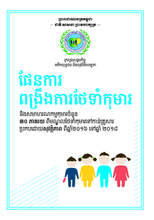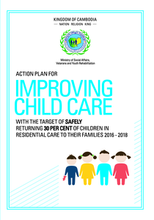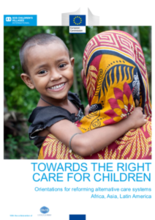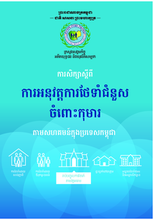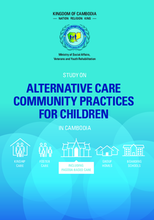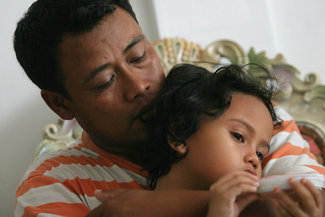

Displaying 421 - 430 of 752
This report evaluates UNICEF's child protection systems building approach in Myanmar, including the review methodology, findings, conclusions and lessons learned, as well as recommendations for the future.
This Action Plan for improving child care, with the target of safely returning 30 per cent of children in residential care to their families 2016 - 2018, was developed to support the implementation of the Ministry of Social Affairs, Veterans and Youth Rehabilitation (MoSVY) Work Platform 2014–2018 and the Sub-Decree 119 on the Management of Residential Care Institutions, which was endorsed on 11 September 2015.
This Action Plan for improving child care, with the target of safely returning 30 per cent of children in residential care to their families 2016 - 2018, was developed to support the implementation of the Ministry of Social Affairs, Veterans and Youth Rehabilitation (MoSVY) Work Platform 2014–2018 and the Sub-Decree 119 on the Management of Residential Care Institutions, which was endorsed on 11 September 2015.
This video shares the story of two siblings reintegrated from an orphanage in Myanmar through the ACCIR Kinnected Program.
The general objective of this study was to conduct a research on the possible issue of institutionalisation in six South and Central American, Asian and African countries in order to strengthen the knowledge of the European Commission on the nature, the extent and scope of institutionalisation and feasibility of de-institutionalisation (alternative care for children).
The ‘Study on Alternative Care Community Practices for Children in Cambodia, including Pagoda-based care’ (published in Khmer) is the first of its kind which sheds light on how different forms of alternative care are being used in the community.
This study commissioned by the Ministry of Social Affairs, Veterans and Youth Rehabilitation of the Kingdom of Cambodia and UNICEF Cambodia sheds light on how different forms of alternative care are being used in the community.
This brief paper highlights some of Young Lives key findings on violence affecting children, exploring what children say about violence, how it affects them, and the key themes that emerges from a systematic analysis of the children’s accounts.
Australian nurse and surrogacy broker Tammy Davis-Charles has been arrested and is awaiting trail in Phnom Penh, Cambodia on charges related to engaging in surrogacy and falsifying documents.
In this video celebrating 60 years of fostering in Singapore, Ministry of Social and Family Development (MSF) features a family who has been fostering for approximately 16 years.


